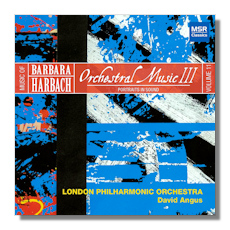
The Internet's Premier Classical Music Source
Related Links
- Harbach Reviews
- Latest Reviews
- More Reviews
-
By Composer
-
Collections
DVD & Blu-ray
Books
Concert Reviews
Articles/Interviews
Software
Audio
Search Amazon
Recommended Links
Site News
 CD Review
CD Review
Barbara Harbach

Orchestral Music III
- Symphony #7 "O Pioneers"
- Symphony #8 "The Scarlet Letter"
- Symphony #9 "Celestial Symphony"
- Symphony #10 "Symphony for Ferguson"
London Philharmonic Orchestra/David Angus
MSR Classics MS1614 62:54
I remember reading an interview with Barbara Harbach in Fanfare magazine in 1996, wherein the interviewer spent most of the time focusing on her keyboard talents, on her work to promote the music of female and other often neglected composers, and on other musical activities of hers. Very little attention was paid to Harbach the composer. But at the time she was certainly better known as a keyboard player, particularly on the organ and harpsichord. While that may still be true, I'll guess she would rather be known as a composer first.
Born in 1946, Harbach has produced a large output that includes many orchestral and keyboard works, musicals, choral and chamber music, film scores, sacred music and various others pieces. Listening to the music on this disc, I would surmise that Ms. Harbach is an incurable optimist, a composer who sees life in a nearly always positive way, generally not brooding over tragedy or personal disappointment, or at least expressing them in a less negative way.
Even in the Symphony #8, subtitled "The Scarlet Letter", the music depicting Roger Chillingworth (second movement), which you would expect to be dark and sinister, comes across as conflicted and disturbing alright, but it also has a sense of hope and brightness, at least to my ears. I think I can say that I have heard few composers who can match her beaming joy and almost unrelenting optimism. But, you ask, does the plentiful happiness translate into something good?
If I can judge from the music on this CD, Harbach is not a composer of just passing interest but appears to offer substantial rewards. The works here are mostly a joy to listen to and I believe many people unfamiliar with her vast output may well want to sample some of it. She could serve for many as the antidote to the dark music of so many 20th and 21st century musical nihilists. Her compositions, at least on this disc, are generally upbeat, devoid of grand design, mostly light in mood, and straightforward and accessible. There are no pretenses here, the music mostly avoiding complexity and generally not reaching to the depths of profundity. Stylistically, her works here are related to that of early to mid-20th century American composers, and at certain moments may call to mind such composers as David Diamond and Roy Harris, though her music is ultimately quite individual. Wind instruments, particularly brass, often carry the main line, and while thematic material can come across at times as somewhat threadbare, the various movements and the works themselves compensate in their brevity.
The Symphony #7, subtitled "O Pioneers", is in three movements and lasts fifteen minutes, pretty close to the length of each of the works here. Its music was derived from Harbach's opera, O Pioneers! An American Opera, and depicts several of its scenes. The symphony contains fine music in its uplifting manner, having a muscular, rugged character much of the time, but also conveying a sense of triumph and joy. Symphony #9, subtitled "Celestial Symphony", is another joyous work, this time of religious inspiration as it was adapted from Harbach's score for the film The Birth, Life and Death of Christ. This is another fine effort, lighter though than you would expect for a work on such serious subject matter. "The Scarlet Letter" Symphony may be the strongest composition on the disc: it's quite probing in its depictions of Hawthorne's three main characters (Hester Prynne, Roger Chillingworth, and Arthur Dimmesdale) and has a weightier expressive language than the other works.
The first three symphonies on the disc are quite compelling works then, but I believe the longest work (nearly nineteen minutes), the Symphony #10, subtitled "Symphony for Ferguson", is the least convincing piece of the four. Harbach is making a sincere attempt here to heal wounds opened by the Michael Brown shooting in Ferguson, Missouri in 2014. She is also addressing issues relating to loss of life through war and injustice (second movement) and making a plea for peace and hope (third movement). Noble though her intentions undoubtedly are, her inspiration in this work is on a lower scale than in the other symphonies. The jazzy style of portions of the symphony and quotations from American folk sources don't quite come across with the proper impact. While there is much good music here, some passages simply come across as a bit of a hodgepodge of disparate styles that don't quite mesh. The finale is the least effective of the three movements. I wouldn't call the symphony a failure, but it's a rank or two below its disc mates.
Still, you have three rather fine works and in excellent performances by the London Philharmonic Orchestra under the knowing baton of David Angus. The sound reproduction is vivid and powerful, and the album notes are very informative and highly detailed. If you're interested in very accessible contemporary orchestral music, this MSR Classics disc may be of strong interest to you.
Copyright © 2017, Robert Cummings


















